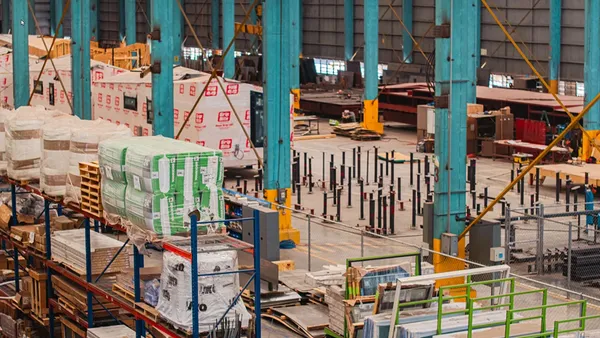Dive Brief:
- The Massachusetts chapter of the Associated General Contractors of America sponsored a statewide opioid stand-down June 5 in an attempt to draw attention to how these drugs are negatively impacting the construction industry. The organization also produced a manual for contractors to identify and mitigate opioid use.
- The employer organization, the Associated Press reported, hosted short talks about opioid abuse at approximately 50 projects during the brief work stoppage. The AGC was motivated to put on the event by recent statistics showing that 25% of all fatal opioid overdoses among Massachusetts workers from 2011 to 2015 were in the construction industry. Construction workers are also six times more likely to overdose that those in other industries.
- Across all industries in 2017, opioid abuse cost the state of Massachusetts more than $15 billion. The AGC, in partnership with Boston Medical Center's Grayken Center for Addiction, has developed an opioid safety program for employers to help them recognize signs of opioid abuse, what to do in case of an overdose and how to tap local resources for assistance in dealing with employee addiction.
Dive Insight:
New England Carpenters Benefit Funds has started covering 90 days of substance abuse treatment for its members, and the Massachusetts Laborers' Benefit Funds is sponsoring a new initiative that helps connect workers to treatment programs.
The abuse of opioids and other types of drugs also is one of the factors that has contributed to an increase in construction worker suicides, according to Dr. Aaron Wilson, chief medical officer at Arizona treatment center Sierra Tucson. The physical injuries associated with construction work, the pressures of production and other stresses all create an environment that could lead workers to self-medicate with drugs and alcohol.
Employers, Wilson wrote in an op-ed for Construction Dive, can help affected employees by:
- Creating a workplace atmosphere that encourages them to seek help.
- Facilitating direct conversations about potential substance abuse.
- Making clear that coming forward about their depression or drug use will not ruin their careers.
- Helping to connect them to treatment.
In addition to considering the human toll of opioid addiction, construction employers also must think about the potential for onsite accidents, which can drive up workers' compensation premiums and put a company on OSHA inspectors' radar. The liability can increase for employers if someone injured by or as a result of an impaired employee's actions can prove the employer knew the employee had a substance abuse problem and did nothing about it.
For this and other reasons it's important for contractors to educate workers on how to spot someone who is under the influence and how to report it, topics that can be addressed easily via the written workplace safety manual or during weekly safety meetings.














